The State of the World: A Strategic Assessment
Governments worldwide remain in a weakened condition in one of the most uncertain and fragile periods in recent memory. How can nations restore their legitimacy and effectiveness in the current global context?
Henry A. Kissinger, Chairman, Kissinger Associates, USA
Chaired by
Klaus Schwab, Founder and Executive Chairman, World Economic Forum
Kissinger gave his own wide-ranging assessment of the state of the world in response to questions from Davos founder Klaus Schwab.
Kissinger spoke about Syria, nuclear proliferation, the Middle East in the aftermath of the Arab Spring, the Israel-Palestinian conflict and more.
On the Middle East: “For one thing, it (the Middle East) is a system in which many of the states were artificially created at the end of the first world war.”
On nuclear powers: “Pakistan has demonstrated enormous sophistication in developing nuclear weapons and could become a source of proliferation in the region.”
The current conflict in Syria, Kissinger said, can be resolved if the U.S. and Russia were to sponsor an agreement that other countries would also back.
On Iran: “The Iranians need to understand that if they keep using the negotiations to gain time to complete a nuclear program the situation will become extremely dangerous … The danger is that nuclear weapons become almost conventional.”
On U.S.-China relations: “They will interact with each other everywhere … These countries will conduct an increasing rivalry.”
On Obama: President Obama was not my first choice in the last election.
On the future of Europe: “One underlying problem is what sacrifices can be asked of populations …The cohesion of Europe depends on the willingness to make sacrifices by those immediately concerned … What needs to be resolved is the relationship between austerity and growth … Whatever happens, the idea of European unity needs to be resolved … Europe needs to be maintained as an ideal even if the ideal solutions don’t exist.”







